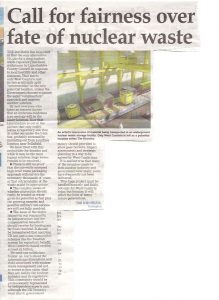Deep Geological Facility and correspondence in UK regional newspaper

A letter of NTW’s member, Tim Knowles, was published in a regional newspaper in Cumbria 🇬🇧 relating to the withdrawal of the only other area than Cumbria as a potential UK Deep Geological Facility location.
This letter underlines how this decision marks a very significant stage in the siting process and clearly affecting the “balance of power” between government, industry and communities.
19th March 2025
Sir,
The inevitable has happened in that the only alternative UK site for a deep nuclear waste repository has been withdrawn by Lincolnshire County Council in response to local hostility and other concerns. That leaves only West Cumbria and its two artificially split “communities” as the only potential location, unless government chooses to ignore the legal “volunteerism” approach and impose another solution.
By now everyone who takes an interest knows that an undersea mudstone type geology will be the likely location. Now that Lincolnshire is out of the picture that only really leaves a repository site fifteen to twenty miles out under the Irish Sea, probably accessed by tunneling out from a surface location near Sellafield. We have lived with this probability for decades and while it may be the most logical solution, huge issues remain to be resolved.;
🔹There is still no proof that the currently accepted high level waste packaging approach will survive the necessary thousands of years or that retrievability of the waste might be appropriate.
🔹The complex issues of whether plutonium should really be treated as waste given its potential as fuel plus the growing security and possible military use options are still not fully resolved.
🔹The issue of the major impact on our community, its infrastructure and the compensation benefits it should receive for hosting are far from resolved. It should be remembered that applying UK law and using comparator schemes like the Swedish system for repository benefit, West Cumbria should receive at least three billion pounds.
We need our politicians to gear up, learn about the international dimensions and risks associated with nuclear waste management and not to accept at face value what they are told by the nuclear industry and its regulators. This community should be professionally represented by independent experts and although the UK Treasury wont like it, government money should provided to allow peer reviews, impact assessments and strategic planning in a way to be
agreed by West Cumbrians.
It is sad but true that many of the promises made by both nuclear industry and government over many years have frequently not been delivered This huge project must be handled honestly and fairly, not only for West Cumbria today but because it will affect the lives of many future generations.
Tim Knowles
in the Whitehaven News
You must be logged in to post a comment.